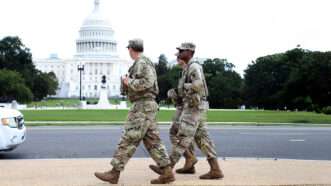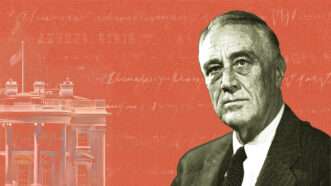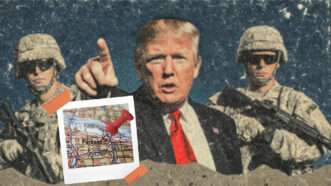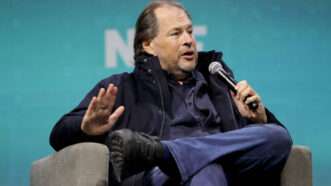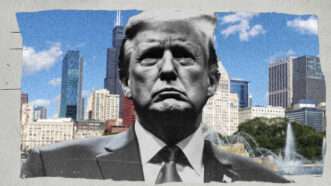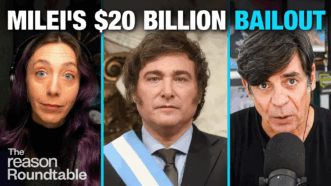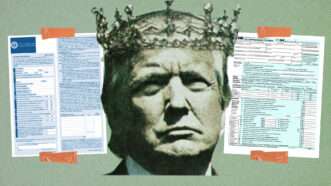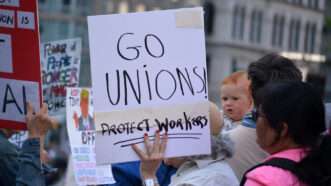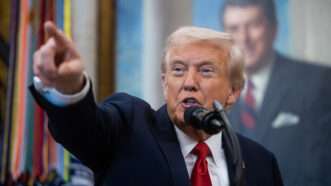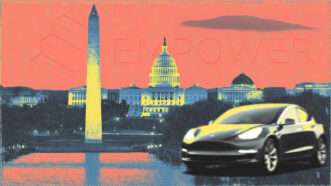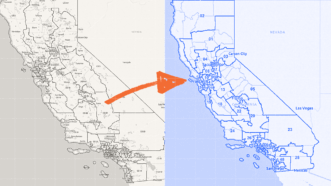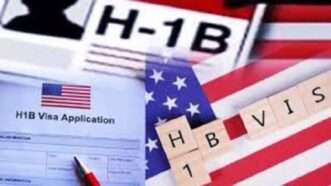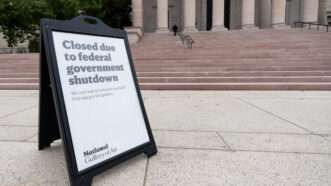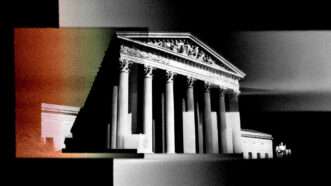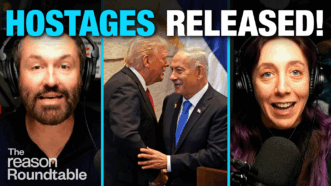Law & Government
Why Fentanyl Smuggling isn't War and Cannot Justify Extrajudicial Killing
Thus, Trump's attacks on boats in the Carribean have no moral or legal justification.
The Government Shutdown Isn't Stopping Trump From Amassing 'Emergency' Powers
As of mid-2025, there were roughly 50 simultaneous national emergencies in force.
Maybe AI Therapists Will Suck. That Doesn't Mean We Should Ban Them.
It is possible to be both skeptical of the supposed effectiveness of AI therapy and wary of sweeping state regulations.
New Jersey Town Tentatively Agrees to Not Seize 175-Year-Old Family Farm
After a nationwide uproar over Cranbury, New Jersey's plan to seize Andy Henry's farm, the township says it's found another site to place a planned affordable housing development.
Is Oregon Proof That Drug Decriminalization Will Fail?
The Drug Policy Institute's Kevin Sabet debates Reason's Zach Weissmueller.
Trump Dares Congress To Take Its War Powers Seriously in Venezuela
The president bet that no one would stop him from land attacks in Venezuela. And Congress hasn’t given him any reason to think otherwise.
Two Federal Judges Apologize For Issuing Opinions With AI Hallucinations
An intern and a law clerk used generative AI, and the judges didn't catch the hallucinations.
Merkley's Marathon Address Decried Trump's 'Authoritarian Grip'—But Executive Overreach Didn't Start With Him
Trump’s presidency may have amplified executive power, but unless lawmakers roll back those powers—and the bloated government behind them—the next administration will do the same.
NBA Betting Scandal Shows How Legalized Gambling Actually Helps Root Out Corruption
FBI Director Kash Patel called it “the insider trading saga for the NBA,” with Chauncey Billups and Terry Rozier among those charged.
"When You Soon Return to Allah": "Harmless Islamic Reference[] About Life and Death" or an "'Absolute' and 'Direct' Threat" to Ex-Wife?
"Allah does not forget, however. This is how people earn their final place in the [h]ereafter."
A D.C. Man Was Arrested for Mocking National Guard Troops with Star Wars' 'Imperial March.' Now He's Suing.
Sam O'Hara went viral for playing "The Imperial March" behind groups of National Guard soldiers in D.C. He also says it led to him being illegally detained.
Help Legislators Legislate Again
Legislative disfunction is at the root of many current controversies, and past legislation bears part of the problem.
What the Japanese Internment Case Teaches About Judicial Deference to Presidential Power
Long-ago debates about executive authority are not as distant as they might initially seem.
The Clean Air Act Is Making Our Air Dirtier
Wildfire smoke is bad for your health. Environmental regulations make it worse.
9th Circuit Court Upholds Trump's Deployment of National Guard in Portland
The decision “erodes core constitutional principles, including sovereign States’ control over their States’ militias and the people’s First Amendment rights,” Judge Susan P. Graber warned in her dissent.
Trump Allegedly Misidentified a Colombian Fisherman as a Venezuelan 'Narcoterrorist'
The potential for deadly error underlines the lawlessness of the president’s bloodthirsty anti-drug strategy.
Marc Benioff's Ideas for Fixing San Francisco Keep Getting Worse
The billionaire Salesforce CEO said Trump should use the National Guard to clean up San Francisco's streets.
On National Guard Deployments, Trump Tells SCOTUS His Power Is 'Unreviewable'
Will the Supreme Court grant Trump the overwhelming judicial deference he demands?
Does Argentina's Bailout Prove Libertarians Wrong?
Plus: the “No Kings” protests, Trump pays troop salaries during government shutdown, and the continued bombing of drug boats in Venezuela
Hoover Webinar with Orin Kerr on His "The Digital Fourth Amendment"
I interviewed Orin on this program earlier this month; seems quite popular, 108K views so far.
Coming Soon to the Supreme Court: Are Tariffs Taxes?
The correct answer is: Yes, even when they are also regulations. Whether the Court agrees could determine the future of presidential power.
Elizabeth Warren Says Companies That Settled With Trump May Have Committed Bribery
While the settlements likely don't meet the statutory definition of bribery, they're still inappropriate.
Still the Stare Decisis Court (At Least For Now)
Even with a six-justice conservative majority, the Roberts Court has not (yet) increased the rate at which it overturns precedents.
District Court Dismisses Another Kids Climate Suit, As Existing Law Requires (Updated)
A suit asking a district court judge to undo every Trump Administration energy policy initiative is dismissed with prejudice; appeal to follow.
Utah's New Union Law Faces a Ballot Box Battle
Lawmakers passed sweeping limits on public sector union power, but opponents have gathered record-breaking signatures to attempt to overturn it in 2026.
Seventh Circuit Rules Against Trump's Use of National Guard in Chicago
The Court of Appeals unanimously refused to stay a trial court ruling against Trump, signaling the judges believe his use of the Guard is illegal.
Trump Erroneously Thinks Killing Suspected Smugglers Is the Key to Winning the Drug War
Until now, the president concedes, interdiction has been "totally ineffective." Blowing up drug boats won't change that reality.
Empower Stays on D.C. Streets as Appeals Court Weighs Future of Rideshare Company
The D.C. Superior Court found Empower still in contempt of court despite updating its software-as-a-service agreement and will reconvene in January.
How Josh Hawley Is Empowering Unions in New York and California
Some blue states are trying to set up their own versions of the NLRB, and Hawley is inadvertently (or deliberately) helping the cause.
How Trump Triggered California's Redistricting Fight
Don't believe the GOP's 'principled' opposition to Prop. 50
US Chamber of Commerce Files Lawsuit Challenging Trump's $100,000 H-1B Visa Fee
This is the second lawsuit challenging the policy, which is both illegal and likely to cause great harm if allowed to stand.
Repeated "Nonexistent Cases" in Filing From >20-Lawyer Insurance Defense Firm
Lawyers at firms of all size, don't let this happen to you.
Texas City Council Approves $500,000 Payment to Former Member Who Said Her Advocacy Led to a Bogus Arrest
The settlement, which followed Sylvia Gonzalez's victory at the Supreme Court, also includes remedial First Amendment training for city officials.
SCOTUS Probably Won't Put Any New Limits on Warrantless Home Searches
The Supreme Court heard oral arguments this week about the "emergency aid exception" to the Fourth Amendment.
Even Marjorie Taylor Greene Thinks Trump's Immigration and Trade Policies Go Too Far
“We have to do something about labor, and that needs to be a smarter plan than just rounding up every single person and deporting them,” the Georgia congresswoman said.
The Federal Workforce Will Be a Little Smaller After the Government Shutdown Ends
We’ll take less government however we can get it.
Deference Due? Trump, the National Guard, and the Misuse of Martin v. Mott
A guest post by Joshua Braver and John Dehn.
Is the Supreme Court's Shadow Docket Causing a 'Judicial Crisis'?
Multiple judges say SCOTUS is going out of its way to grant emergency relief to the president without even bothering to explain why.
Trump's Art of the Deal for Peace in the Middle East
Plus: new tariff threats escalate China trade war, federal layoffs begin amidst the government shutdown, and Democrats face a candidate-quality crisis
Forum Shopping in the First Circuit
An interesting Reuters report on the new locus of lawsuits challenging the Trump Administration.
DCCHS Oral History of Justice Ruth Bader Ginsburg
A set of interviews with the late justice is now available


